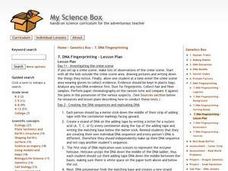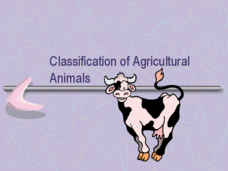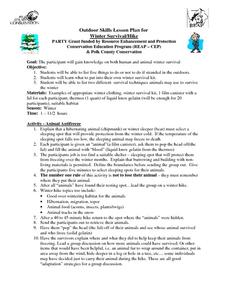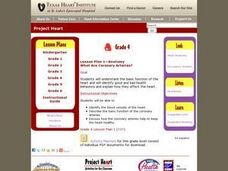Curated OER
Diploid Genetics and Chromosomal Inheritance
Given the phenotypes of offspring in mice, flowers, and human blood type, genetics pupils practice determining the genotypes of the parents. Four short answer questions follow. The entire assignment will require learners to put on their...
Center for Technology in Teaching and Learning
CSI: The Experience - Family Forensics
Forensic scientists depend on their observation skills to analyze evidence down to the molecular level. Middle and high schoolers practice making observations and predictions with a series of crime scene activities, which includes a...
Alabama Learning Exchange
Bloodstain Pattern Doesn't Lie......
An interesting instructional activity on hypothesizing about the diameter of a drop of blood that is splattered. To test their theories, learners work in groups to make blood droplets splatter from different heights. They use graphed...
Curated OER
Circulatory and Respiratory Systems Unit - Biology Teaching Thesis
Students Explain how an increased level of activity translates to cells needing more oxygen and how the lungs supply this oxygen by entering the blood stream. They also can explain that the heart is responsible for moving both oxygenated...
Exploratorium
Seeing Your Retina
Using a dimmed flashlight, life science learners can see the network of blood vessels that line the back of their eye. Darken the room and let them try this activity as part of your unit on the eyeball. Also consider some of the other...
Curated OER
The Trial of the Bloody Sucker
A blood sucking what? Grade schoolers identify the characteristics of blood sucking parasites. They organize their information, identify their arguments, and present them to the class in persuasive arguments. They participate in a debate...
Curated OER
DNA Fingerprinting
Students study the process of DNA Fingerprinting and how DNA Fingerprinting is used in solving crimes. They examine a crime scenario that involves collecting DNA Fingerprinting information from blood collected at the crime scene. They...
Curated OER
Exercise and the Human Heart
Interpret data and learn about the human heart in one activity! After learning about the way blood flows in the body, fifth graders answer two questions about a graph displaying pulse rate. They then take their own pulses to find the...
Serendip
Homeostasis, Negative Feedback, and Positive Feedback
So many bodily activities depend on homeostasis! Give learners a solid background to understand the basic process of the human body. Scholars first examine negative feedback loops contributing to body temperature regulation and then a...
Curated OER
Elastic Recoil in Arteries and Veins
A lab in which high schoolers examine the difference between arteries and veins. Budding biologists will find out which blood vessel can stretch furthest, recording their data in a table then answering several questions evaluating their...
DiscoverE
Heart Valve Replacement
Put your heart into it. Scholars design and build replacements for mitral heart valves. Obviously, they can't test their creations on a real heart, so a box with marbles (to represent blood cells) will suffice.
Curated OER
Classification of Agricultural Animals
Students of biology should find this powerpoint interesting as it recaps the basics of classification and Latin and common names of familiar farm animals. The slides are clear, not loaded with text, and lead the students through the...
Think Map
Shakespearean Idioms
How do you react if you're "hot-blooded?" What happens when you engage in a "wild goose chase?" And what are "salad days?" Use this worksheet and the online Visual Thesaurus to answer these questions and more. Based on...
Museum of Science
Virtual Heart
No more beating the pavement to find a virtual model of the human heart. See one in continual real-time motion, and layer it to highlight electrical impulses, blood flow, and valve activity.
Polk County Education
Winter Survival/Hike
Hibernation isn't just about staying fed, it's about staying warm. Young environmentalists explore the importance of staying warm in the wilderness with a short lesson about surviving in the wild. Using gelatin to represent warm-blooded...
NOAA
Vertebrates II
Mammals of the ocean unite! Or not. The 20th installment of a 23-part NOAA Enrichment in Marine sciences and Oceanography (NEMO) program investigates how warm-blooded marine mammals survive in water. In the class activity, learners use...
Gottlieb
Kennings vs. Stock Epithets – A Quick Review
Bone-crusher. Troll-wife. Battle-sweat. Blood-worm. What study of Beowulf would be complete without offering readers of this Old English epic poem an opportunity to craft their own kennings and epithets? Provide individuals with a copy...
Curated OER
The Heart
Students are introduced to the parts of the heart and the flow of blood through the heart.
Curated OER
Hiv/aids, Year 1, Day 2
Students watch a video about the spread and biology of HIV/AIDS. They discuss white blood cell counts and ways the disease is transmitted and ways it cannot be transmitted. They draw a battle between the HIV and the immune system.
Curated OER
Anatomy - What Are Coronary Arteries?
Fourth graders explore the basic function of the heart, identify blood vessels and coronary arteries. They identify good and bad health behaviors and discuss how these behaviors affect the heart. Students explore how the coronary...
Curated OER
Osmosis
In this biology activity, students determine how many solvent and solute molecules there are in the red blood cell and the IV fluid. Then they determine whether the IV fluid is hypertonic, hypotonic, or isotonic to the red blood cell.
Curated OER
Circulation
In this circulatory system activity, students label the diagram of the heart to include each of the terms listed. Then the draw arrows showing the path of oxygen-rich blood and poor blood. Students describe pulmonary circulation and its...
Curated OER
Multiple Alleles
Young scholars observe models of the ABO blood system including erythrocytes, antigens, and antibodies. They investigate the antigens that result from certain allele combinations and move antibodies to determine whether agglutination ...
Curated OER
Chaucer's "The Prioress' Tale"
Learners examine Anti-Semitism in literature. In this Chaucer lesson plan, students review the concept of blood libel and then identify and analyze the Anti-Semitic message of "The Prioress' Tale."
Other popular searches
- In Cold Blood
- Blood Pressure
- Blood Types
- Blood Vessels
- Blood Flow
- Blood Platelets
- Blood Cells
- Forensic Science Blood Type
- Blood Circulation
- Red & White Blood Cells
- Blood Typing
- Cold Blooded























